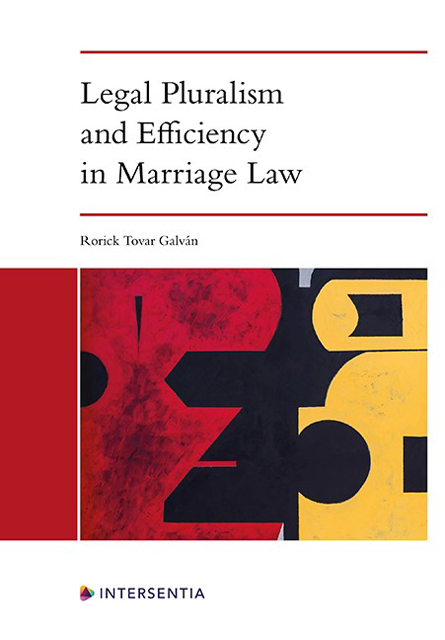Book contents
- Frontmatter
- Dedication
- Miscellaneous Frontmatter
- Foreword
- Preface
- Acknowledgments
- Contents
- List of Cases
- Introduction: Uncertainty and Inconsistency Surrounding the Determination of the Applicable Law in the EU Instruments on Matrimonial Issues
- Part I Economics As A Point Of Departure To Explain The Substantive Rules On Matrimonial Issues
- PART II Economics as a Point of Departure to Build a System of Conflict of Laws For Matrimonial Issues
- Conclusion: Certainty, Precision, Coherence, and Simplicity in the Determination of the Applicable Law
- Bibliography
- Index
- About the Author
- Frontmatter
- Dedication
- Miscellaneous Frontmatter
- Foreword
- Preface
- Acknowledgments
- Contents
- List of Cases
- Introduction: Uncertainty and Inconsistency Surrounding the Determination of the Applicable Law in the EU Instruments on Matrimonial Issues
- Part I Economics As A Point Of Departure To Explain The Substantive Rules On Matrimonial Issues
- PART II Economics as a Point of Departure to Build a System of Conflict of Laws For Matrimonial Issues
- Conclusion: Certainty, Precision, Coherence, and Simplicity in the Determination of the Applicable Law
- Bibliography
- Index
- About the Author
Summary
The variety of legislation at an international level represents a barrier for married couples planning to reside in another country. Each movement between jurisdictions can cause significant changes in the rights and obligations derived from a marriage, as courts can use different approaches to determine the legal system – or legal systems – governing relationships with international connotations. To address this issue, the European Union has decided to take matters into its own hands. With a view to assuring the proper functioning of the internal market, it has promoted the creation of three international instruments dealing with the determination of the applicable law to legal issues arising from marriage: the Hague Protocol of 2007; Regulation 1259/2010; and Regulation 2016/110. The material scope of application of each of these instruments only focuses on one specific aspect of the marriage, namely maintenance obligations, divorce and property regime. As a result, not all legal effects arising from the marriage are covered by those instruments. Conflict of laws rules applicable to inter alia the names of the spouses, the validity of their marriage, or ownership of personal effects of the marital relationship have not been harmonized. Nevertheless, the efforts of the European Union must not be underestimated, not only because the newly regulated aspects of the marriage are of great importance in the daily life of spouses, but also due to the large number of states that have incorporated these rules into their national legal systems. Currently, they are used by domestic courts to resolve conflict of laws in marital matters in more than half of the Member States of the European Union.
Notably, these instruments grant spouses the possibility to determine by themselves the law governing their relationship. They also contain specific conflict of laws rules for cases where spouses have not made use of party autonomy. However, although the creation and entering into force of these instruments represent a significant improvement over the previous situation, there is still room for improvements in their content. On one side, the restrictions imposed on the spouses’ freedom of choice are significant compared to the broad discretion people have in the field of international contract law pursuant to the Rome I Regulation.
- Type
- Chapter
- Information
- Legal Pluralism and Efficiency in Marriage Law , pp. xi - xviiiPublisher: IntersentiaPrint publication year: 2022



